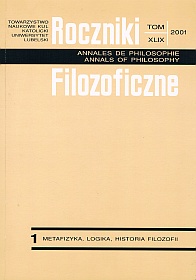Alvin I. Goldman’s theory of knowledge and justification
Abstract
A. Goldman proposes a softened version of the naturalistic epistemology connected with cognitive sciences. His theory of knowledge and justification belongs to the trend of extemalism and reliabilism. With reference to the Gettier problem Goldman (1967) suggests adding the condition of causal relation between belief and the fact concerned with the belief to the standard definition of knowledge. In (1976) he replaces the casual definition with the causalreliabilistic one: a true belief is knowledge if it is produced by reliable processes, that is by processes that generate true beliefs in the actual world and would generate them in relevant counter-factual situations (the concepts of relevant alternatives and knowledge as the ability to discriminate are involved here). In his recent works written on the basis of data from cognitive psychology Goldman goes beyond the Gettier problem: if knowledge is a prototype concept analysing it by means of necessary and sufficient conditions loses sense. Contrary to numerous externalists Goldman includes the traditional concept of justification in externalist epistemology. Justification of belief is a function of global reliability of the process that generated it, as reliability is in at least 50% the tendency of the process to generate true beliefs. Goldman's reliabilism struggles against (1) the problem of generality (how broad the definition of the types of processes that are supposed to be reliable may be); (2) the problem of the demon's world (the malicious demon's victims have the same foundations for their beliefs as we have, but still their beliefs are unjustified in the light of reliabilism as they are generated by unreliable processes); (3) the problem of clairvoyance (a reliable clairvoyant meets all the conditions of the reliabilistic theory of justification, and yet his beliefs are irrational): (4} the problem of the range of reliability (which possible worlds are relevant for justification). Responding to these problems Goldman first (1988) differentiates strong and weak justifications and then, changing his position to one of virtue reliabilism, he replaces reliability with what is considered reliable (1992b). By this very fact he agrees to the internalists' thesis saying that reliability is important for justification if it is accessible for the subject. However, Goldman means the collective subject (the community's opinions) and this is the basis for his externalism. He does not agree to subjectivism of the individual subject and he does not change the basic idea that epistemology should be close
Copyright (c) 2001 Roczniki Filozoficzne

This work is licensed under a Creative Commons Attribution-NonCommercial-NoDerivatives 4.0 International License.





